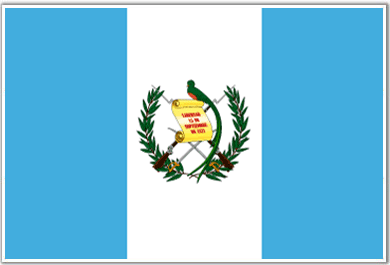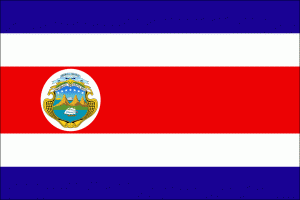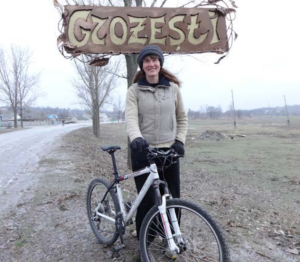All posts by Michael Sabrio
Costa Rica
International Relief & Development Organization: Our Work in Yemen
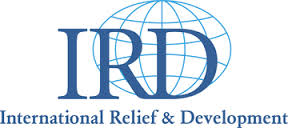
Unified only in 1990, the Republic of Yemen remains a strongly traditional society. However, tribal and regional rivalries, divisive political leadership, an influx of refugees from various countries, and the influence of al-Qaida linked terrorist cells have made it difficult for the country to develop socially and economically. IRD has been working in Yemen since 2009 to support communities to identify and discuss the underlying causes of conflict, promote community participation and activism, improve health and hygiene, assist refugees and asylum-seekers, and provide third-party monitoring for donor-supported infrastructure improvements.
THIRD-PARTY MONITORING
IRD provides on-site physical verification of various World Bank-financed infrastructure projects to ensure they comply with specifications as well as social and environmental guidelines. In 2014, IRD will deliver at least 500 inspection reports. The work includes a community monitoring component and trains staff from the Government of Yemen on how to process and effectively use field data submitted by the field engineers and community monitors.
WATER, SANITATION & HYGIENE
In Hodeidah, IRD improves the health of vulnerable communities by increasing access to improved water sources, including generating potable water through home-based and school-based collection, storage, and treatment. In schools and communities, IRD is promoting improved hygiene through awareness and behavioral change campaigns and sanitation infrastructure improvements. In selected regional schools and villages, IRD work with school leaders, local community leaders, and parents through formally organized elected water management committees to apprise them of the importance of school and community water supply and sanitation. The committees develop management, maintenance, and community financing plans to improve the quality and quantity of clean water along with community and school sanitation conditions. IRD is also addressing the emergency WASH needs and enhancing the resilience of approximately 54,000 people.
In the remote eastern desert regions of Hadramout and Al Mahrah, IRD increases access to water, improves healthy hygiene practices, and enhances livelihood resiliency for nomadic and pastoralist families. Residents in these areas experience frequent droughts and recurrent conflict, which exacerbate food insecurity and malnutrition, stress already weak water and sanitation systems, and create vulnerability to health crises. IRD is working with these communities to build water reservoirs (known locally as karafans) to provide clean, local sources of water for both human and livestock consumption and to promote healthy hygiene practices. Karafans, a well-known resilience strategy and a cost-effective form of rainwater harvesting, can provide communities with clean, local, and reliable source of water, even during periods of drought. The 15 karafans will be constructed and 15 water management committees will be established to manage them, serving 13,000 people.
SUPPORT FOR REFUGEES
IRD strengthens the self-management capacity of the Somali refugee community, Yemen’s largest refugee community and, since 2011, refugee communities from Ethiopia, Iraq, and Eritrea. Through targeted trainings for refugee committees and sub-committees, IRD builds their capacity to cope with the country’s ongoing civil unrest. IRD-supported community leaders, outreach workers, and volunteers organize the displaced communities to inform them of their rights as refugees and to address their emergency needs, especially those of the most vulnerable. Having demonstrated its emergency response capacity and humanitarian drive, IRD is now responsible for managing UNHCR assistance programs for vulnerable urban refugees.
COMMUNITY THEATER
Since 2009, IRD has used community grassroots theatre continuous to help Yemeni communities openly discuss and think of ways to address the underlying causes of community conflict. Using a nationally known theatre troupe in five targeted governorates, radio and media campaigns, and focus group discussions, IRD educates rural Yemeni audiences about the country’s transition process and disseminate messages on key transition and governance issues. The project promotes civic education on issues such as voter registration, conflict resolution, decentralization, constitutional processes and reforms, peaceful election processes, and the importance of women’s involvement in political processes. Through this grassroots approach, the project also gathers data on citizen’s concerns in the targeted governorates and shares them with key local, regional, and national stakeholders.
Retrieved from http://www.ird.org/our-work/by-region/middle-east/yemen on 2 November 2014 by Internet Archive WayBackMachine.
International Relief & Development Organization: Our Work in Georgia

After a decade of independence following the collapse of the Soviet Union, the southern Caucasus region — Georgia, Armenia and Azerbaijan — continues to face economic difficulties and the risk of renewed conflict and internal strife. Specifically, conflict between Armenia and Azerbaijan over the disputed area of Nagorno-Karabakh, and secessionist movements in the Georgian regions of Abkhazia and south Ossetia have created more than 900,000 refugees and internally displaced persons (IDPs) in the Caucasus.
In response to this growing humanitarian crisis and rapid decline in living standards, IRD began operations in this country in 1999. Some highlights of our work include:
- Rural Enterprise Support — Assistance to farmers and other rural entrepreneurs to improve the quality of their lives by increasing their incomes;
- Health Care — Emergency distribution of pharmaceutical and medical supplies, training for medical professionals and construction of medical facilities;
- Emergency Survival Aid — Distributing food parcels, hygiene kits, school kits, blankets, tools and seeds to refugees, IDPs and local vulnerable populations;
- Repatriation and Reintegration — Providing direct assistance to IDPs and refugees through direct food and clothing distributions and income generation opportunities; and
- NGO Capacity Building — Providing small grants and management assistance to local NGOs to help them improve and expand community services.
Retrieved from http://www.ird.org/our-work/by-region/europe/georgia on 1 November 2014 by the Internet Archive WayBackMachine.
KA-POW!!
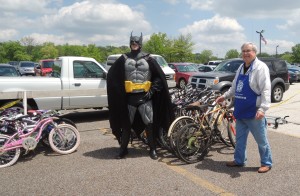
On May 17th, 2014, the Norristown, PA, Rotary Club ran a collection as part of West Norriton Township Community Day. We were basically part of a community fair, which made the collection really unusual: besides our bicycles and sewing machines, also on hand were pony rides, a SWAT team, a helicopter landing, a magic show, Pinkie the Clown, a police exhibit with handcuffs that one of the Rotary members tried to use on her club president, and “Costumed Characters”—Batman stopped by to give the thumbs up to our bikes. A Rotary Club member has a heating and air-conditioning business with a trailer where the club collects and stores bikes and sewing machines throughout the year. We got 39 bikes and 4 sewing machines, including a gorgeous old Singer treadle machine with ornate wooden carving on the drawer fronts. Great job, guys, and keep up the good work.
How do Bicycles and Sewing Machines Continue to Support FIDESMA’s Mission?
By Patricia Hamill
Spring 2014 InGear
You’ve read about our partner in Guatemala, FIDESMA, the organization that promotes economic development through micro-credit, training in textile design and agricultural programs, among other efforts. They are doing so much to contribute to the needs of the people in their region and we are pleased to have some updates for you.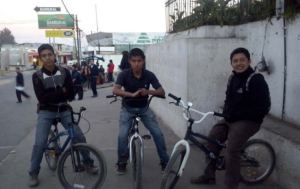
Three young men, poor students, were awarded a grant from FIDESMA for employment training in welding. The funds were raised through the sale of the bicycles sent from P4P. Without the bicycles that were transformed into needed funds, these young men could not possibly have begun, much less finished, the four months of required training. They completed their course in November of 2013.
These young men also needed to be able to put these skills to use. This of course meant that they needed employment opportunities and a way to access the locations where they would work. A blacksmith shop was made available to them and there they created metal ornaments, bikes and candlesticks to generate the income that would continue to reinforce their financial independence. In December, these men were able to acquire bicycles that had arrived in the 14th container shipped from P4P and received by ECOLOBICI. They can now travel readily between home and work. Ease of travel was one of the obstacles the young men had to overcome since, as you’ve read so many times about so many of the people in our partners’ regions, they would have to pay for public transportation, walk many miles or, in this case, take a motorcycle taxi.
Now 6.00 quetzals (about .75 in US currency) a day are saved by using a bike and they have the added advantage of keeping in shape. They have benefited from ECOLOBICI’s project supported by P4P and they plan on continuing their studies and efforts at financial success in 2014.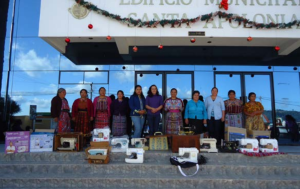
In the container mentioned above, there were also 15 sewing machines, some earmarked for particular women who had visited the FIDESMA training center. These women, from Santa Apolonia in the District of Chimaltenango, work sewing typical huipil blouses mostly. These are traditional garments that are loose fitting like a tunic. Since these kinds of shirts are in demand, they stand to make a reliable income continuing to sew these and other viable pieces of clothing. There are more men and women who will be able to access these machines and learn how to use them or continue to work at their tailoring businesses.
A Personal Note from Moldova
June 2014
We love to hear from people whose lives have been touched by P4P and our partners. We have been contacted by a woman who is connected with the Peace Corps and is in the process of campaigning for P4P to come to Grozesti, Moldova. If all goes well, we will ship to them in early spring. Just one container of bikes can change the lives of people in this small isolated town. Here is her message:
“My name is Carol Stadden. I am a retired baker serving as a Peace Corps volunteer for two years in a small Moldovan village in Eastern Europe called Grozesti. Moldova is a country approximately the size of Pennsylvania and is considered the poorest in Europe. Peace Corp’s mission is to promote world peace and friendship with a commitment to improving the quality of life in each host country. I am in the Small Enterprise Development program. When I first arrived at [the] site, I heard there was a village where everyone rode a bike. How incredible! In 2005, a Peace Corps volunteer, working with P4P, had arranged for 500 bikes to be shipped to his village of Pelenia. I talked to the mayor of my village and she was eager to give Grozesti the same opportunity.
“Many people in the village own bikes, but they are extremely old and heavy one-speed models unsuitable for navigating the rocky, hilly, unpaved roads of Grozesti. Because of P4P, the communi ty will not only be able to purchase sturdy, quality bikes for an extremely affordable price but the bikes will enable farmers to get to and from their fields more easily and children to ride to and from school–sometimes as far as 5km. I hope to work with a group of high-school students to catalogue, repair, and sell the bikes so they can learn valuable business and employment skills. There is also the possibility that a community member will step forward to start a small bicycle parts/repair shop. Any surplus funds from this project would be used to assist them.
“I am an avid cyclist back home and the first thing I did once I arrived in Moldova was to buy a bicycle. This is the perfect way for me to share my enthusiasm for cycling while promoting small business. These bikes are generating so much excitement in the village, I believe there may be a bicycle club in Grozesti’s future! To learn more about Grozesti, please go to grozesti.weebly.com. One of my first projects was to create this website as a means of promoting the village and assist me in integration.”
Give Smiles With a Bicycle!
by Ened Mato
Spring 2014 InGear
How nice it is to donate a smile! It is a grim fact that some Albanians face the indifference of passers by and the silence of fellow citizens in general. Many children are mired in a cycle of hopeless days without experiencing the joys of a real childhood and, confused, stare straight into the future without a sense of hope. Nearly 120 of these children at the Colourful Lodge and its twin centers, every day, find not only hospitality, accommodation and a warm meal, but above all the care, love and why not, the image of what they lack and miss: Home!
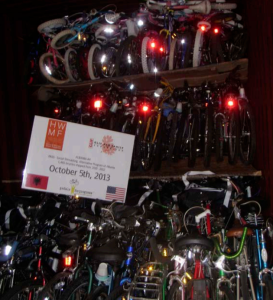 In the framework of the initiative which has already made possible the delivery of 100 bicycles in 10 similar centers in Albania, the New Year’s holidays at the Colourful Lodge came under the rhythm of chiming bicycle bells that were donated by Ecovolis in collaboration with Pedals for Progress. Ecovolis representatives spent the holidays with these wonderful children, helping them learn to pedal the colorful bicycles that they, before, could only watch go by on the noisy thoroughfares of the capital city. The little ones learned that use of these bicycles created an excellent opportunity to secure a beautiful, clean, green and friendly environment to live in, quite different from the dusty wild roads of the city they wander every day.
In the framework of the initiative which has already made possible the delivery of 100 bicycles in 10 similar centers in Albania, the New Year’s holidays at the Colourful Lodge came under the rhythm of chiming bicycle bells that were donated by Ecovolis in collaboration with Pedals for Progress. Ecovolis representatives spent the holidays with these wonderful children, helping them learn to pedal the colorful bicycles that they, before, could only watch go by on the noisy thoroughfares of the capital city. The little ones learned that use of these bicycles created an excellent opportunity to secure a beautiful, clean, green and friendly environment to live in, quite different from the dusty wild roads of the city they wander every day.
This is not all. The people from Ecovolis also promised that they would work with the children every week, to continue helping them ride safely and have fun. For these children it was wonderful discovering that bicycles from Pedal for Progress were previously used by their American peers, whose stories and names were shared.
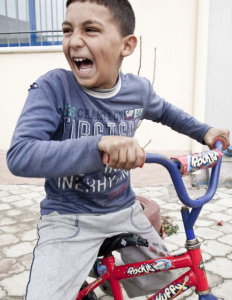 It was so miraculous to see the smile on a young boy named Zino. He was the first to learn to ride a bike and even swore that one day he would become the fastest cyclist in the world. Little Izidora, who spent the day cleaning the windshields of “four-wheels” vehicles as they call them, said that she loved the bike exactly because it did not deliver those “disgusting fumes and that disturbing noise.” A child named Abel immediately began calculating the increased number of packages sold, if he was to rely on his own bike instead of his tiny legs.
It was so miraculous to see the smile on a young boy named Zino. He was the first to learn to ride a bike and even swore that one day he would become the fastest cyclist in the world. Little Izidora, who spent the day cleaning the windshields of “four-wheels” vehicles as they call them, said that she loved the bike exactly because it did not deliver those “disgusting fumes and that disturbing noise.” A child named Abel immediately began calculating the increased number of packages sold, if he was to rely on his own bike instead of his tiny legs.
One of the girls, Mira, she begged for one last ride and said she would have loved to have her own bicycle so she would have the opportunity to visit her mother during the day and show her her earnings. When she was told that there would be no “last ride” because those bicycles would be staying at the Colourful Lodge, her happiness was immense. Her felicity was shared among Adrian, Ihsira, Ledio, Daklea, Oriada, Teuta, Laert , Esdalin, Landi, Artemis, Donna and dozens of other children, whose smiles were the most precious gift for the representatives of Ecovolis. “This is one of those cases, when you start making a gift, but you are the one receiving the most wonderful gift of all. To us this great gift was the smile of these kids,” Ened Mato, the Director of Ecovolis said. “Ecovolis in collaboration with Pedals for Progress is determined to continue this initiative. So far we have donated 100 bicycles in 10 centers and we are merely getting started. We will make other children smile by riding bicycles. And it’s not just about entertainment, but also presenting to them the vision of a beloved city, clean, and safe, since they are precisely the ones who walk on these streets every day.”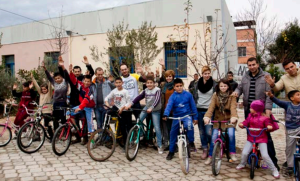
It is great discovering that besides the gift of a smile, there has been bestowed upon these children a chance for a new world view—a new, achievable dream for those who all they have had are dreams. All this from the presence of a simple bicycle. In the mean time, they are riding—and smiling—without even knowing that this may be may be a ride towards the future.
Sewing Machines Contribute to School Enrollment and Health Care in Tanzania
by Patricia Hamill
Spring 2014 InGear
In October of 2013, with the generous support of grant money from one of our valued supporters, Clif Bar Family Foundation, P4P shipped 41 sewing machines to the region of Dar es Salaam (DSM) in Tanzania. Our partner there, Community Support Mission (CSM), works closely with those in poverty to help them earn their own living and create a healthy and sustainable lifestyle.
According to CSM’s director, Jonathan Mulokozi, four of the machines went to the Messack Secondary School, located in Kivule, in the District of Ilala. Of the 350 students, 60 are orphans and 42 are from very poor families. The machines’ primary use to date has been to sew uniforms for schools. The income earned from the production of this clothing has covered school fees among other difficult costs these children must meet if they are to have an independent and economically viable adulthood.
CSM also works with families or groups in need. They donated 3 machines to women whose families were struggling to maintain decent living conditions and hoping to stay together instead of dispersing for work in far-away districts or regions. One particular woman, Anna Ntimba, was fortunate in that she already knew how to sew; however, she did not have the income to afford her own machine. Her husband was recently diagnosed with a heart disease and could not easily support the family, much less pay the hospital bills. With the machine in hand, Anna was able to earn the income she needed to keep her family together and enable her husband to begin healing.
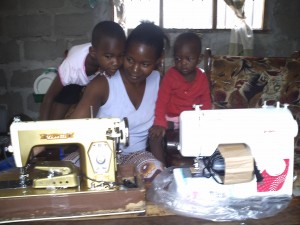 In January of this year, CSM donated sewing machines to 4 women whose families are in poverty and cannot afford to send their children to school. CSM has also pledged to provide 2 machines to each group of 3 people who wish to form their own business. As well, 2 secondary schools in Kagera are slotted to receive sewing machines so they can continue to earn income to cover basic school needs for local orphans.
In January of this year, CSM donated sewing machines to 4 women whose families are in poverty and cannot afford to send their children to school. CSM has also pledged to provide 2 machines to each group of 3 people who wish to form their own business. As well, 2 secondary schools in Kagera are slotted to receive sewing machines so they can continue to earn income to cover basic school needs for local orphans.
Not all the partners we work with request both sewing machines and bicycles. When this combination does come into play, there are double the opportunities opened up to people in a region, thus increasing the odds that we can create a lasting positive impact. We are looking forward to receiving news and photos of the students and their families as more machines and bicycles become available to them.
World Cup Fever
Spring 2014 InGear
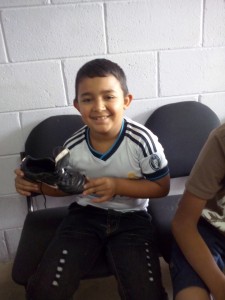
Pedals for Progress’s mission is really to give these people a viable chance of a wonderful life. We certainly concentrate on employment opportunities and healthy transportation alternatives, but sometimes we stray.
In the last shipment of 2013 to Guatemala we included 100 pairs of cleats and 18 used soccer balls. The soccer balls act like large Styrofoam chips protecting the bicycles, and the soccer cleats just fall down between the bikes, taking no space.
Supplying sporting equipment is certainly not the most important thing we do and not something that we will ever do a lot of, but when we can put a smile like this on a young person, how can we not?

